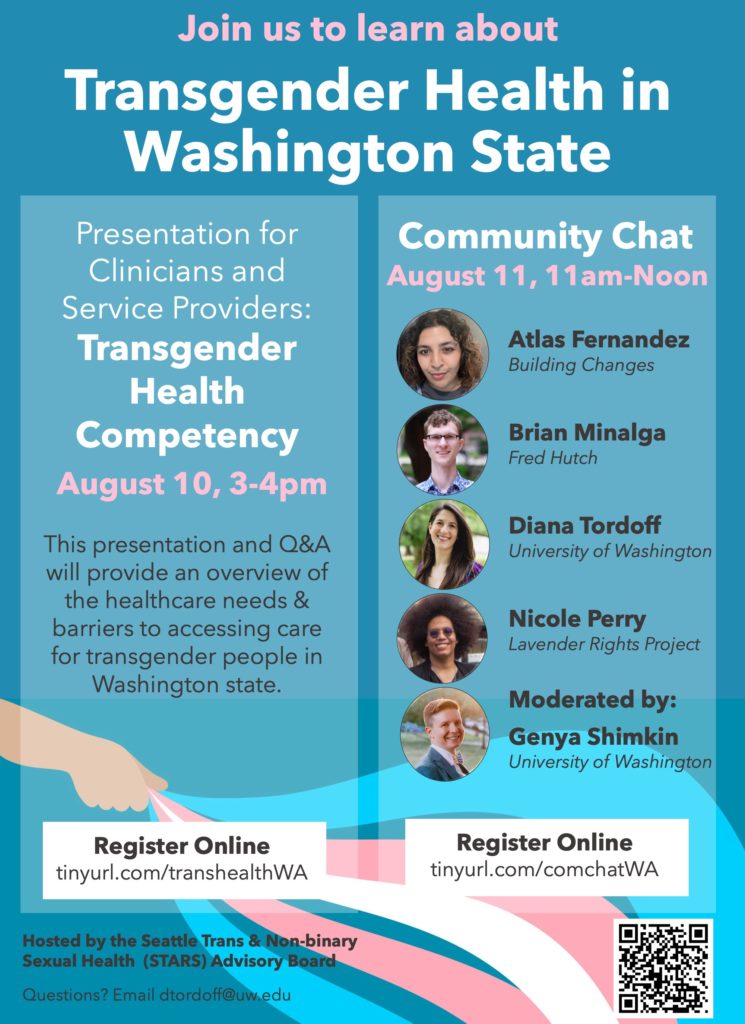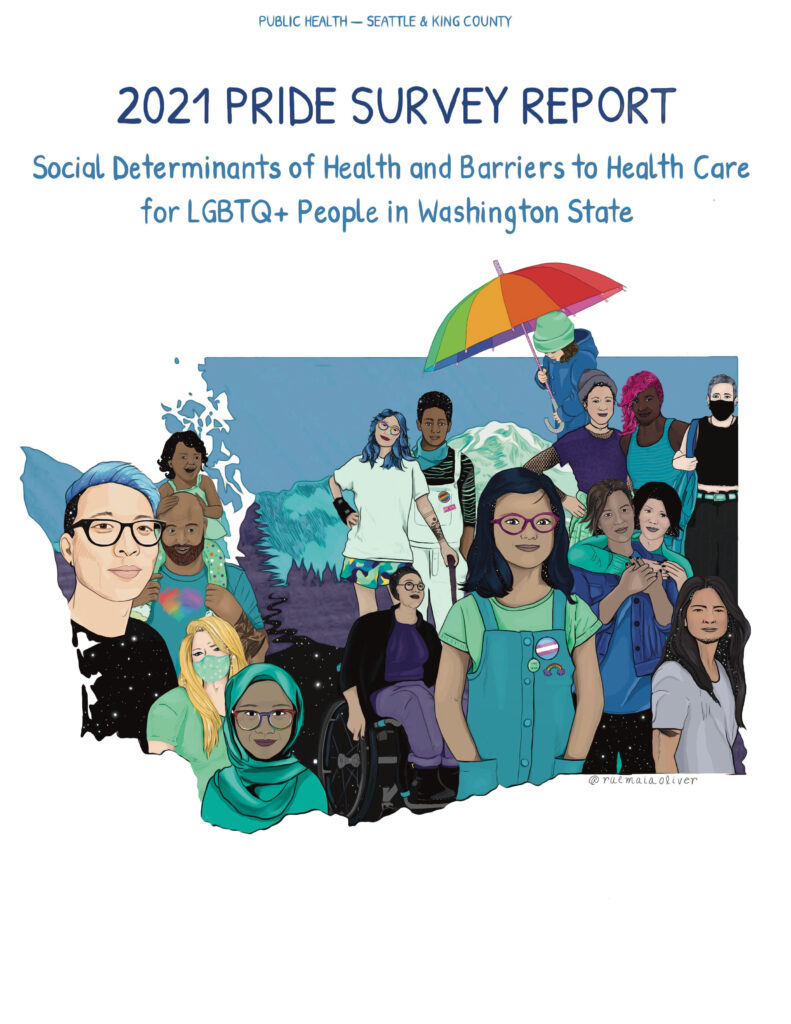
What’s a Community Advisory Board?
Community advisory board members are a group of representatives and advocates from the general public who meet with researchers and scientists. The goal of community advisory boards is to address power imbalances in research and incorporate the expertise of community members to produce knowledge in collaboration with academic researchers. Members of community advisory boards are often asked to represent and speak to concerns of the communities impacted by research as well as to relay information between the these two groups.
The Research Study
This research focuses on sexual health and HIV prevention among transgender and non-binary people and their partners in Seattle and King County, WA. The goal of this study is to combine information from multiple sources of data to answer four key questions. Ultimately, the information gained from this research will be used to improve clinical care, local HIV/STI surveillance, and public health interventions for transgender and non-binary people and their sexual partners. Dr. Tordoff received funding from the National Institute of Health (NIH) through the National Institute of Allergy and Infectious Disease for this study, as part of her doctoral dissertation. The Northwest Center for Public Health Practice and the American Sexually Transmitted Diseases Association (ASTDA) provided additional funding for this advisory board.

Why does this study have a Community Advisory Board?
This research study uses pre-existing data collected from transgender and non-binary people in King County and across the US. This means that all of the data have already been collected by other study teams (some national and some based in Seattle). Each of these studies had varying degrees of leadership, involvement and input from trans communities.
What’s the point of having a community advisory board if we’re not collecting new data? Community advisory boards can still play an important role in addressing power imbalances in this type of research (called “secondary data analysis”) in two key ways. First, research findings still have the potential to influence clinical encounters and public health decisions that impact trans people and their partners (in Seattle or elsewhere). Therefore, transgender and non-binary community members should have a voice in how data are interpreted, even if no new data are collected. Second, research findings can be shared with and disseminated more directly to trans and non-binary communities from which the data were originally collected.
The Seattle Trans and Nonbinary Sexual Health (STARS) Advisory Board Achievements
The STARS Advisory Board includes 9 trans and non-binary people from the Seattle area and formally convened from February 2021 through July 2022. During this time, we achieved a number of accomplishments, which are highlighted below.
2021 Pride Survey Report: Social Determinants of Health and Barriers to Health Care for LGBTQ+ People in Washington State.
In 2021, the STARS Advisory Board informed the collection of new data on topics that were important for the LGBTQ+ community in Washington. We added a new optional survey module to the end of the core 2021 Pride Survey, and annual survey conducted by Public Health-Seattle & King County primarily for HIV/STI surveillance purposes. These data were published in 2022 on the Public Health–Seattle & King County website, and are available at tinyurl.com/WApridereport. Original cover art by Rue Maia Oliver.

Community Presentations on Transgender Health in Washington State.
In August 2022, the STARS Advisory Board hosted two virtual events for members of the trans community in Washington State as well as for clinicians and service providers to improve their structural competency for working with trans communities. Slides from these presentations are included below:
Presentation for Clinicians and Providers: Transgender Health Competency Slides
Media
“There’s more data for trans people with HIV than any other disease — but it’s still flawed”. STAT News. https://www.statnews.com/2024/07/30/transgender-health-hiv-prevalence-model-lack-of-sogie-data/
“Intersectional barriers to HIV/STI healthcare among Washington State transgender and nonbinary communities.” Fred Hutch Cancer Center Science Spotlight. https://www.fredhutch.org/en/news/spotlight/2023/11/vidd-tordoff-epidemiology.html
Publications
Erasure and health equity implications of using binary male/female categories in sexual health research and HIV/STI surveillance: recommendations for transgender-inclusive data collection and reporting. Tordoff DM, Minalga B, Gross BB, Martin A, Caracciolo B, Barbee LA, Balkus JE, Khosropour CM. (2022) Sexually Transmitted Diseases. doi:10.1097/OLQ.0000000000001533 [pdf]
Heterogeneity in HIV/STI Prevalence and Prevention Utilization Among the Partners of Transgender and Non-binary People. Tordoff DM, Minalga B, Perry NL, Gross B, Khosropour CM, Glick SN, Barbee LA, Duerr A, and the Seattle Trans and Nonbinary Sexual Health (STARS) Advisory Board. (2023) Sexually Transmitted Diseases. doi:10.1097/OLQ.0000000000001796 [pdf] [Won Best Paper by Early Career Investigator Award, First Place, 2023]
A Quantitative Intersectionality Analysis of HIV/STI Prevention and Healthcare Access among Transgender and Non-binary People. Tordoff DM, Fernandez A, Perry NL, Heberling WB, Minalga B, Khosropour C, Glick SN, Barbee LA, Duerr A, and The Seattle Trans and Non-binary Sexual Health (STARS) Advisory Board. (2023) Epidemiology. doi:10.1097/EDE.0000000000001669 [pdf]
Comparing Two-Step Approaches to Measuring Gender Identity: The Reliability and Applications of Asking About Sex Assigned at Birth versus Transgender Self-Identification. Tordoff DM, Minalga B, Ó Catháin N, Fernandez A, Gross B, Glick SN. (2024) American Journal of Epidemiology. doi:10.1093/aje/kwae341
Including Transgender Populations in Mathematical Models for HIV Treatment and Prevention: Current Barriers and Policy Implications. Tordoff DM, Restar A, Minalga B, Fernandez A, Dimitrov D, Duerr A. (2024) Journal of the International AIDS Society. doi:10.1002/jia2.26304
Presentations and Talks
The STARS Advisory Board: Community Engaged Research with Transgender and Nonbinary Communities. National Cancer Institute (NCI) Sexual and Gender Minority Scientific Interest Group. July 2023
Comparing Two-Step Approaches to Measuring Gender Identity: Ascertaining Sex Assigned at Birth versus Transgender Self-Identification. Oral presentations at Society for Epidemiologic Research (SER). 2023 Jun 13-16; Portland, OR and the National Transgender Health Summit. 2023 May 6-7; San Francisco, CA.
Heterogeneity in HIV/STI Prevalence and Prevention Utilization Among the Partners of Transgender and Non-binary People. Oral presentation at CDC’s STD Prevention Conference. 2022 Sept 19-20; Virtual and E-poster presentation at AIDS 2022. July 28 – Aug 2; Montreal, Canada.
A Quantitative Intersectionality Analysis of HIV/STI Testing, Positivity and Current PrEP Use among Transgender People in Washington State. Poster presentations at CDC’s STD Prevention Conference. 2022 Sept 19-20 and AIDS 2022. July 28–Aug 2; Montreal, Canada.
PubMed / GoogleScholar / ResearchGate / GitHub / Bluesky / X
